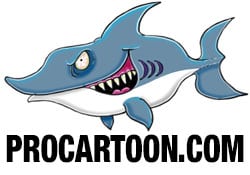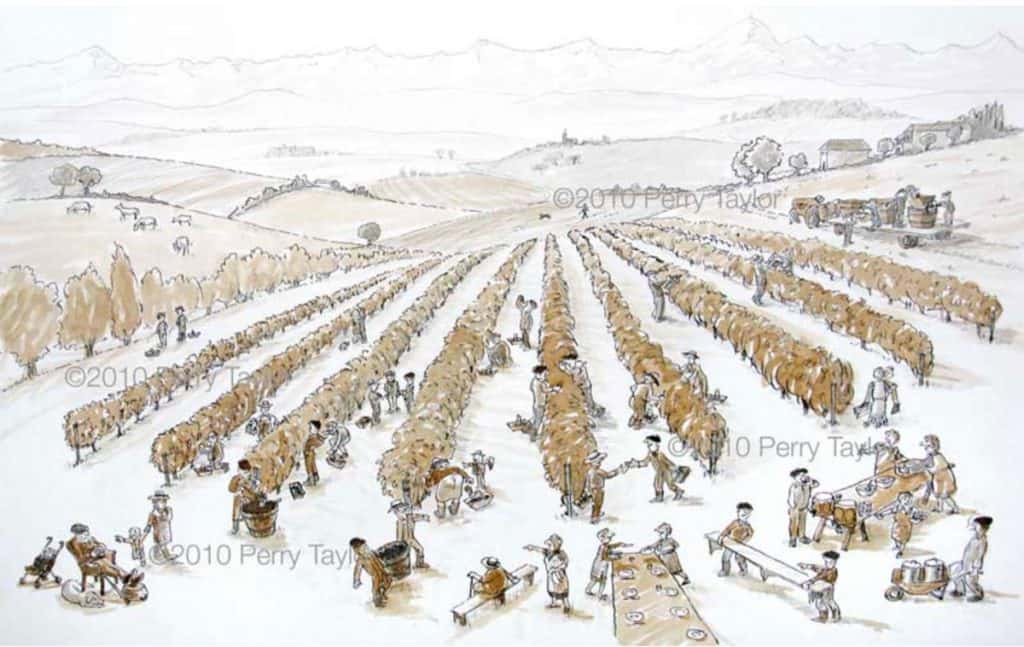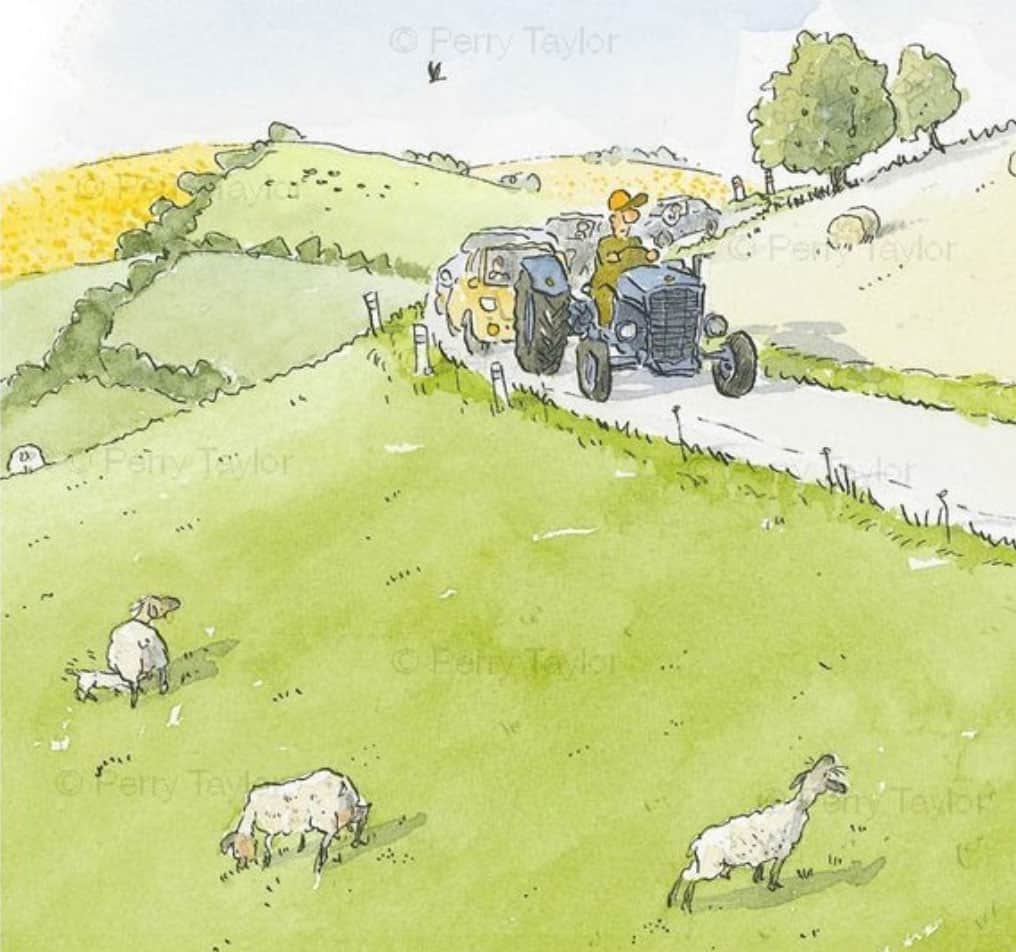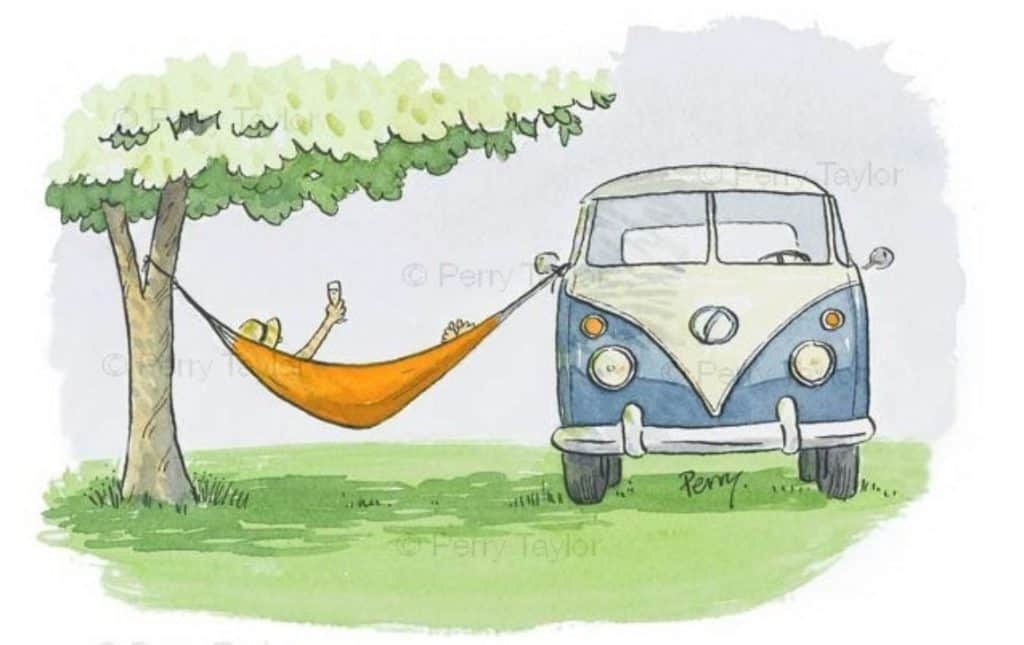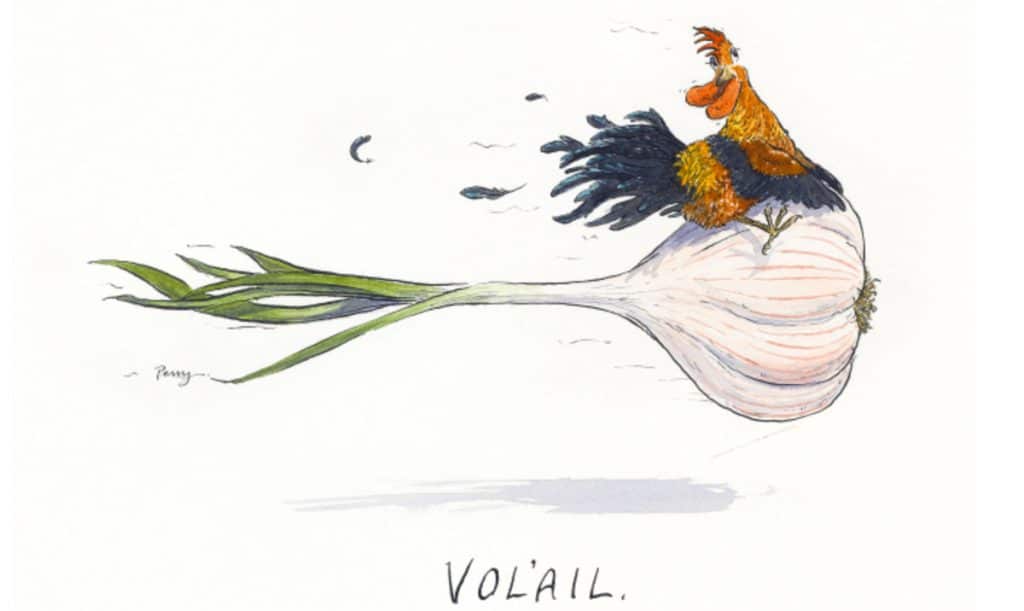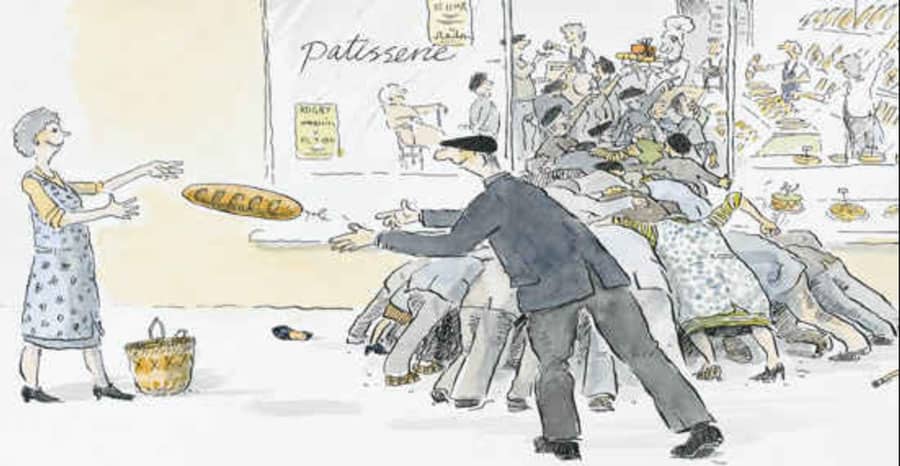Procartoon – Podcast 8 Interview with Perry Taylor
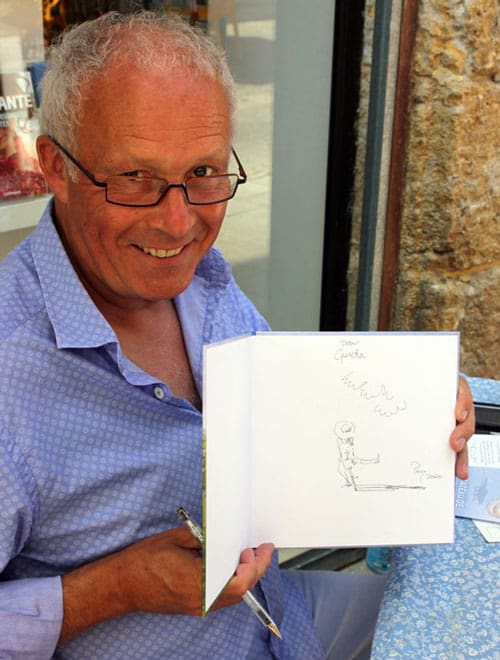
In this episode of the podcast, I talk to professional cartoonist Perry Taylor.
Perry originally, from Oxford, England has lived in Gascony France since 2004 and unlike many ex-pats has absolutely immersed himself into the quirks of French life.
His fame has grown to such an extent, that the tourist board have thanked him for doing a better job at promoting the Gascony region, through his candid cartoons of local life, than they have!
He has studied local architecture, traditions, customs, food and drink and a way of life in this beautiful corner of France that is reminiscent of rose bespectacled summers from years gone by.
Perry masterfully reflects this wonderful tranquil lifestyle in pen and ink and astounds the local folk with vibrant cartoons, packed with detail as they dissect the Gascony psyche with warmth and lashings of wit.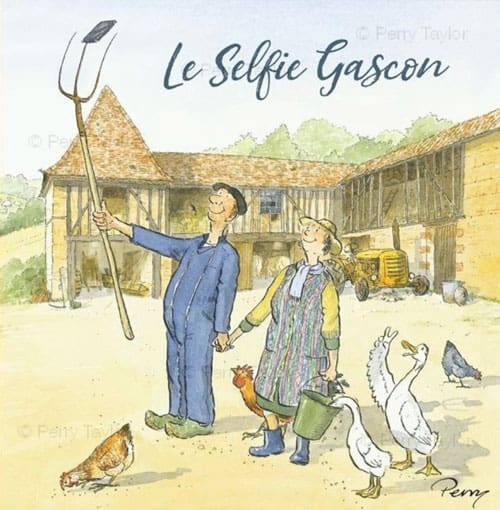
It was through my father, who lives much further north in the Burgundy region, that I got to hear of Perry’s French adventure. After visiting his web site and reading Perry’s ‘voyage’ from the Cotswolds all the way to a stunning house in the South of France, I knew I had to feature him on the Podcast.
He accepted my invitation and was kind enough to send me a copy of his latest compilation of cartoons. I was simply blown away by the artistic skill and great sense of humour that radiates off every page.
Scroll down to read the extensive show notes below in conjunction with the Podcast Audio – All links in the Podcast are detailed in the show notes plus additional images and screenshots to clarify and technical discussion in the text.
Procartoon Podcast 8 with Rob Nesbitt
This Episode is Sponsored by JohnOverall.com
WordPress and Web specialists.
Resources mentioned in the podcast:
Show Notes for Procartoon Podcast 8
Rob: Hi, Perry, and welcome to the Procartoon Podcast.
Perry Taylor: Hi, Rob. Thanks for inviting me.
Rob: When did your cartooning career begin and what was the influence that made you start drawing?
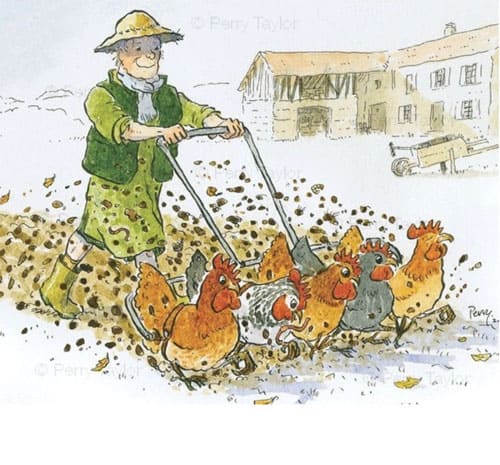 Perry: I suppose I always did cartoons as a kid and I was cartooning also with my colleagues, my tutors, and stuff like this. I thought that was a crazy world, the advertising world that I entered into was even crazier.
Perry: I suppose I always did cartoons as a kid and I was cartooning also with my colleagues, my tutors, and stuff like this. I thought that was a crazy world, the advertising world that I entered into was even crazier.
Characters were often larger than life. I would cartoon them, mostly because of the injustices of being a creative person in an advertising world where you come up with a great idea, a great campaign, and then they go off, and between them and the account person from the client, they change the headline, they change the concept and come back. You were just being used and abused. I’d often do cartoons about what we call the bag carriers.
Rob: Right. Are there other artistic members or ancestors in your family?
Perry: Well, apart from my grandfather who really guided me a lot, we come from, well, a long, long, long way back way, we’re from the Hathaway family. We were the Hathaway-Taylors up until, I think probably three generations ago, they dropped the Hathaway.
Anne Hathaway was my great, great, great, great, great– I think it’s nine ‘greats’ grandmother. As you may or may not know, she was married to some bloke who was pretty good at doing plays and lived in Stratford-upon-Avon.
Anne Hathaway’s cottage was, I suppose the family home until, well, quite some time, I think 1850, something like that in the ’40s. That’s when it was finally given over to the National Trust and then I think the William Shakespeare Society. I can’t remember who runs it now. I was there a little while back even though, being supposedly part of the family, you still have to pay your shilling to get in and see it.
Rob: [laughs] I’ve been there myself. I have visited Perry’s ancestral home. Did you follow an art-based academic life back in England?
Perry: Yes, I did. Since I was always drawing, I did my O-Level Art, A-Level Art, I did really well in that. I had a great art teacher, Andy Crisp if you’re out there, he was a fantastic calligrapher. He also used to say, “Taylor, I’m the one that tells jokes around here,” because I was always the comedian at the back. Or, in art class, I was always at the front, I have to say.
From there, I went on did a foundation course in Banbury, just north of Oxford, that was for a year. Then I went on to London to what was Hornsey School of Art, which became part of Middlesex Polytechnic, and that was a four-year course, which is graphic design, information communication art, and scientific and technical illustration, which was really a little bit too finicky for me.
All the girls seemed to be drawing the bugs and the flowers and leaves, and all us guys did all the technical stuff, which is doing an exploded three-dimensional view of plane engines and stuff like that, that was a lot of fun.
Rob: Are you a full-time cartoonist? If so, when did this happen? What tipped the decision?
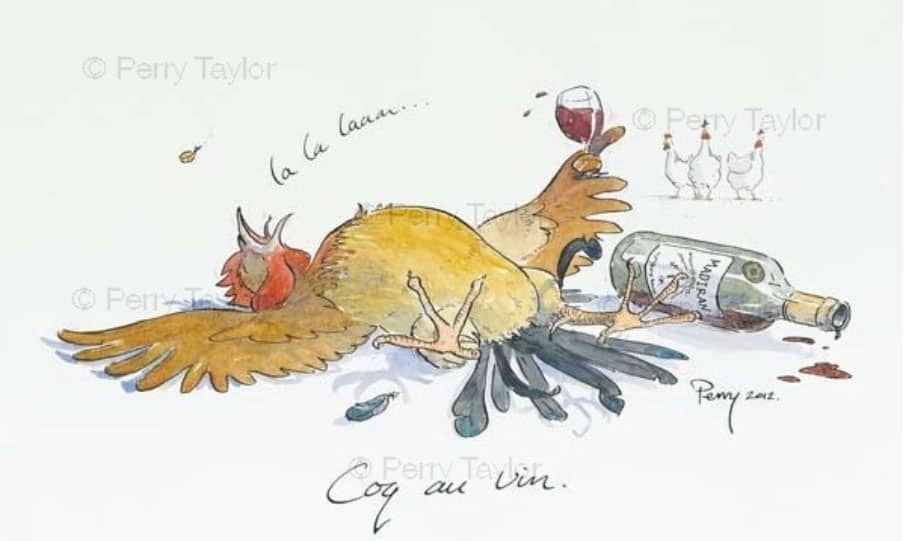 Perry: Obviously, I’ve had a creative life working as a graphic designer then as a creative person, an art director, and then creative director for advertising agencies.
Perry: Obviously, I’ve had a creative life working as a graphic designer then as a creative person, an art director, and then creative director for advertising agencies.
We just eventually decided – my wife is Dutch, I lived in Amsterdam at that time – we had enough, we wanted to do something else. I had a bit of a burnout, to be honest, running my own agency. I spent two years in meetings. I never touched a magic marker in that time. It was very frustrating seeing all the crazy guys we had there having fun and me going into another new business meeting.
After four years of that, I said to my partners, “I’m out of here.” We came to France and I picked up an ink pen, which I hadn’t touched since I was at art college, and started doing some little doodles of the local villages, and local people.
One of my influences is Sempé, I don’t know the Jean-Jacques Sempé. He did hundreds of covers for The New Yorker. I love the fact that he can do a drawing in black and white and it’s just a little old lady in a field, and there’s something going on. There are lots of little details, you don’t need text.
It’s one of those exasperating little moments in one’s life, when one has to make a decision or is confronting things. It’s just so simple and I love it. It has a warmth to it, it gives us a warm smile, and there’s humanity in it. I felt that’s the way I was, the way I felt, and I started drawing the locals from there and these little elements, little characters came out.
Once I did one for a family who lived in the same village, and they invited us to come and pick grapes. We were four generations. That was the grandma and the grandfather falling asleep, they were looking after the baby, the rest of us were there with big buckets going up and down, and lots of conversation, funny things happening in between, bottles of beer at the end of each row. It was a great day and then at the end we then gathered under the tree, there was a huge table full of the hams and jambons and the pâtes and the foie gras from their own animals.
As a thank you, I drew this cartoon which is basically the vines with all the different things I’d seen that day. I gave it to him as a present saying just that I had a wonderful time.
They said, “Well, this is amazing.” Then they called me back a couple of days later, and said, “Could we have a couple of copies because all the family wants to have one?”
Rob: [laughs]
Perry: I started making copies. I just thought about it. Caroline said, “You’re on a winner here.” I said, “Yes.” I started doing some, then I did some really nice, beautiful medieval villages that we have here with a little bit of shenanigans going on in the front left, the little papi going by in his slippers and cycle. You could walk faster than him though, with his baguette strapped in on the back and all sorts of stuff.

That’s how it grew, and after still working as a graphic designer, and illustrating, obviously getting hassled and frustrated by having to reach, change things and change things for the client, and think, “Oh, it can’t be billed,” and, “Here we go again.”
Caroline said, “You know what? I think you can make a great living if we really put our minds to it, both of us together.” That’s what we did six, seven years, oh, eight years ago now we did that and we’ve never looked back.
Rob: That’s brilliant. You’ve had an interesting career as a graphic designer, and an advertising art director working in London and Amsterdam. Could you describe what the work entailed and some memorable projects that you worked on?
Perry: When I started as a graphic designer, you didn’t have computers, there were really just something that the typesetter had. You’d have a sheet of text, it was A4 text, and then you’d count off the letters, and then from there with like a slide rule, you could work out the size of the type, the leading in between each line and the width.
That would then go off to the typesetter, they’d type it out. It would then be brought back on a sheet of bromide paper. Then we’d put it through a wax machine, slice it, and put it on to, we had like an architect has the tables with the horizontals, stick that down.
Then of course there’ll be the corrections. Then have 10A blade, a scalpel, and slice between the lines and change things around, and set all that up. That would all be blue-lined baseboards because they would not be seen by the cameras and there would be the trim and gutters and things like this.
The most technological thing we had at that time was a photocopier that did A3 or A4 or a couple of percentages left and right. We used to play around with those and a grande projector which is one of the things where you stuck your head in with the two huge lamps underneath and you’d boil your head while you were then tracing paper on the tracing paper to get it to another size.
Now, most people say, “What?”
Typesetters have gone, the typographers, the fantastic typographers with their art rule, just became dinosaurs overnight when the Mac arrived. The graphic design was very much that and that was working logos.
I did up posters for the National Theatre for the World Festival Ballet. Also some West End theater. I also did labels for wine, champagne, Melitta coffee. Crikey, I did stuff for Wright’s Coal Tar Soap I seem to remember. Also some record sleeves for A Flock of Seagulls. Remember them?
Rob: Yes.
Perry: Seagulls were in– what was that? on Zomba Records. Then I moved across into the advertising side, I’m just more interested in more of the concept because I thought I love word plays and concepts. I got myself into an agency, a recruitment agency first of all, and then moved into retail and then full-time advertising.
That was great working on campaigns for Grolsch beer. Then, later, moving to Amsterdam, I had the opportunity, is that Nissan Europe had just moved into the European Headquarters in Amsterdam, and our sister agency in Amsterdam had won the account, but unfortunately they had no one that worked on cars.
They contacted our agency and said, “Have any of your guys worked on cars before?” I stuck my hand up and said, “Oh, absolutely.” Can start on the BMW. The only thing I’d ever done was a lottery prize for a pharmaceutical client we worked for was a BMW so I’d actually drawn a BMW and put it into this ad.
They said, great, great, great. I was on the plane two days later, met an American copyrighter. It was an international team, Japanese, German American, God knows who was there. We did this whole campaign to launch the Micra as it was then.
I was supposed to be there for a week to help, but after two days they said, “Would you like a contract?” I said, “Absolutely.” I got an 18-month contract and ended up being there for 14 years.
Rob: What is your process when a client commissions you for cartoons?
Perry: That depends. When I first started doing it, I would take on everything that they would give to me and all the elements and it would become a mishmash of the brother and sister, the dog, the house, and we’ve got to have this hobby in and her horse. It almost looked like I’d photoshopped some 20 different elements into a drawing. It didn’t always work for me.
I think I’ve become stronger and more confident in myself over time, is that now I dictate what I think should work.
I said, “If you want a Perry, then it will be a Perry. Give me a few of your thoughts about what you’re looking for.” As we say, “Give me the freedom of a tight brief but don’t nail me down to the point that I’ve got to have all these elements in.”
Generally, I try and say, “I want to keep my character in the drawings that I’m creating. I want it to be my idea based on my observation from you.” Generally, they said, “That’s great.”
I’ve just done a huge wine map of a part of Southwest France. I think there are seven or eight different regions and growers around here. They said, “We want you to do the map. So long as you just keep the roads and the châteaux and the domains in place. You have carte blanche.” Which was great.
In every field, lane, and village square, there’s something going on, they’re seeing someone playing ball, there’s a fisherman, there’s a hunter, there’s someone having a pee behind a tree, there’s a couple of old guys playing ball, there’s people hunting mushrooms, and they’re picking grapes and all sorts of little things happening. You’ve got ducks and geese and all sorts of characters, all doing naughty things as well. You have to really look well.
That’s now on this big map that they now I’ve got a typographer’s who’s put all the text in all around it so it works with the tourist. That was good fun because they gave me the freedom to be myself and not feel hampered.
Rob: In the early days, I was trying to do everything that they wanted but you can’t and it just spoils it then for yourself, your artistic flair goes out the window. Did you ever have a client from hell apart from many?
Perry: Yes. I worked with a Japanese agency for two years, Asatsu. They had their team that had come in from Japan. We were working on Mitsubishi Europe, the cars. That was really difficult because the client didn’t speak any English and that was the working language. I was dealing with the Dutch, who were very blunt, straightforward, and get to the point, whereas the Japanese are more evasive than the English are. We’ll talk around. It’s what we say or what we don’t say is what we mean, if you know what I mean?
Rob: [laughs]
Perry: We don’t say what we mean. They’re three degrees even further.
You have the two worlds apart from the Japanese account man saying, “Yes.” Then the Dutch going, “Yes.” I said, “No, no, no, that doesn’t mean yes. It just means yes, he’s politely saying he understands.
He’s now going to take this back two/three levels up and then this will be seen by the President in the end, it didn’t come back down. It’ll be nothing like what he’s just said. You think he’s just said yes to you, believe me.”
I used to work as a mediator between the Dutch who were frustrated and the Japanese who were fronted and not wanting to lose face.
I was there, I was the creative coordinator for Spain, France, Germany, England, and Holland. Bloody nightmare.
Again, I bought my flat in that time. I thought you know what? I really don’t care. I spent a lot of time simply working on projects. I had the creative teams go out and doing stuff but I just worked on my flat. When it came to the end of the two-year contract, I went freelance. I said, “That’s it. No more.”
[laughter]
Rob: I don’t blame you. It sounds horrific. You moved to France in 2004 and you bought a house in the- Forgive my pronunciation–
Perry: Hautes Pyrénées.
Rob: Yes.
Perry: Which means the high Pyrénées. It’s not actually the highest point, it’s just it’s the middle of the Pyrénées. On the west coast, you have Pyrénées-Atlantiques, that’s where Bayonne and Biarritz, that side. The Pyrénées-Orientales which is where you’ve got Perpignan just north of Barcelona, that side, but we’re in the middle. That’s the Hautes Pyrénées the high Pyrénées.
Rob: I’m glad you’ve said it for me!
You’ve already intimated why you went to France but why did you relocate and how have you found life in France?
Perry: I think it was a life-changing event, absolutely. I thought that Amsterdam was the best place in the world. Having lived there for 14 years, I just loved it. You get on the bike, you cycle through to all the cafés, over the canals, you could be in the countryside in 10 minutes.
It was becoming a little less tolerant than it was when I was first there at the beginning of the ’90s. People would get a little more uptight, and also more and more tourists. It always was a beautiful cosmopolitan village, that was what I loved about it. You’d take 25 minutes to get from one side to the other on a bike.
To a certain extent, I needed to get away from that simply because of what was going on with my company.
When we were looking, Caroline spoke pretty good French, my French wasn’t too bad. Having worked down in the southeast of France, in Côte d’Azur, I did lots of photoshoots and film shoots for car clients that I work with. I worked with Daewoo and Opel, and Nissan as I said, and a little bit Renault.
They have all the model agencies down there, production agencies, they have the studios. You’d go to Antibes and they’ve got the big harbour wall there where Mercedes and everyone’s fighting to get there for that beautiful light coming off the water.
I was doing loads of shoots down there, and I loved it. Of course, I wasn’t paying the bills, the agency was paying the bills.
We went down there on our honeymoon and we thought, “We’ve got to go and have a look at this, it could be great.” It was expensive, in fact, we looked at the properties and it was just crazy.
There was a certain hardness to the people, I think because they’d been invaded by the rich and the wealthy. You’ve got the Russians coming down and the Arabs coming down and the well-to-do Brits I say, all coming down and this stuff and they’re all into these fenced communities.
A little like when I was working in South Africa a couple of times, everything was fenced off with an alarm. To think well, that’s your little paradise which isn’t really great.
We then went across to look more to the west where an old colleague of Caroline had great friends. She said, “If you’re going down that way, go and have a look.” We took a flight to Bordeaux jumped in the car, and as we came to a place called Condom – don’t laugh, Condom!
I just saw this beautiful landscape which, for me, was like the Cotswolds, but you had sort of all the pillowcases of the Pyrénées in the background and the cypress trees. For me, at that time, I didn’t realize that it had been said before, but I said, “This is like a Tuscan Cotswolds.” It was beautiful.
What I loved about it is that everything seemed untouched. There was no big industry, there wasn’t really anything. The big cities were fine, but it was mostly villages, it was agriculture, but these beautiful medieval villages. It was like, as a lot of people say, the time stopped still in the 1950s, 1960s.
Papis, they still drive around, they’ve still got the bérets, they still drive around in Renault 4s, and 404s, and C15 Citroën vans, and that’s the way it is. The market’s exactly the same, people are doing the same thing.
I ended up thinking, “This could have been from a Jacques Tati film,” who was also one of my great heroes. We just found the peace and we just loved it. I think we both needed that.
We started looking and we went down five or six times and I thought, “Okay, the prices are sort of all right. I know that we’ll find something here that we like.” When we came back, I just had a discussion again with my partners, and I thought– Well, I won’t say what I thought, it begins with an F.
Rob: It’s er, France?
[laughter]
Perry: That’s right, yes, yes. That was it, I went back, I said, “When we go back, I’m resigning. I’m stepping out and we’re going to start a new life.”
Caroline just was so pleased, she’d been waiting to get away forever. That was it. I went back and told my partners and said, “We’re gone.”
We put the flat on the market, it was sold within a month amazingly. Everything in storage, cats in a home for a couple of weeks, and then that was it. In fact, we went down with the car. I bought a trailer, a big old trailer, learnt how to reverse it twice, around the corner. I thought, “Okay, that’s fine.” Filled it, that was two days when we left, filled it with half a dozen suitcases and toolkits and two bikes, and off we went.
We’d hired this little hunting pavilion, which is about 7 by 7 meters, it was a hexagon, 4 meters high so you couldn’t heat it. It was ridiculously high. That’s like 16 feet or 15 feet or something. That was it for 14 months.
We then looked around every day in the car and finally found something that wasn’t on the market at all. This little old lady that Caroline knew, She’s a Dutch lady, she doesn’t believe in negotiating, I’m a softy on that level. That was it.
We negotiated our way with her over a period of three months. Then three months later, we got the key and we moved in. It’s a beautiful old farmhouse. It’s a 250-year-old farmhouse, with lots of what we call the colombage, the wood frames, it’s probably almost a meter-thick walls downstairs. It’s beautiful cool in the summer and nice and warm in the winter.
We’ve done a lot with it, loads of stuff, but it’s changed my life really, because moving here, again, starting to draw again, I’ve now changed my career completely and I’m a little bit of a– quite well known here. I’m known as an ambassador for the Gers by the tourist office, the president of the Department of Gers came up and shook my hand the other day, actually we shook elbows because we were still in confinement. He said, “I want to thank you because you’re doing a better job than we are at advertising.
Rob: Your cartoons typify French life beautifully. What do your French friends think of your artwork?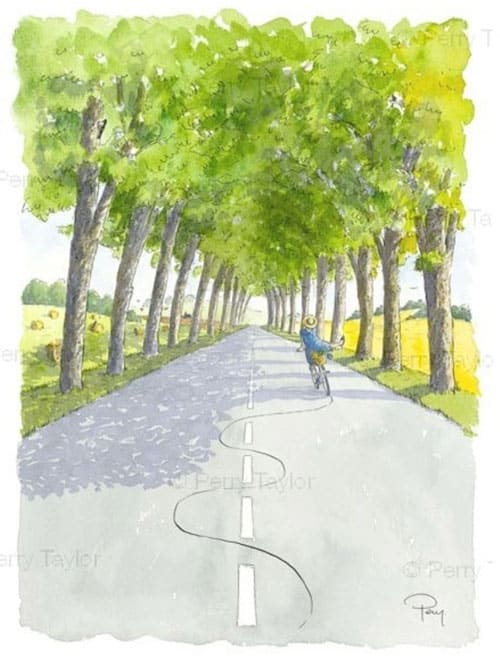
Perry: Genuinely, they’re astonished that someone from outside can portray them in such a way.
They said, “How do you know this is?”
I said, “Well, I watch and I ask, and I love talking to the older generation because they have all the anecdotes of how it was before.”
I think there’s a warm serendipity, there’s a feeling of comfort when we think of happy days in our grandma’s garden of eating strawberries with granddad there. I think as children, we had that sort of comfort zone, and summers were always warmer and longer and we could put our feet in the streams and we could do all sorts of fun stuff as kids.
Nowadays, you’re frightened to even have your child 10 yards away from you on the street. It’s a different world. I think that is very important, the genre that I’ve picked up on because it touches me as well, but no, they’re astounded.
I do lots of stuff about the hunt, or the vineyards or the market. I just go to the market and watch and chat with people. I just follow the gestures and how they stand and what they do, and then I hear these words and phrases.
I love wordplays. I’ve done a lot of French wordplays which they think, “Well, how does that work? You’re not even French and you do French wordplays and we haven’t even thought of that one.” I’ve always done wordplays in English and in Dutch as well.
That was great and so yes, I’m being commissioned all the time to do stuff, they said, “Because you’re the go-to man.”
I’m now doing new bag-in-box wines for the top wine houses here with illustrations, my style of illustrations. They say, “We give you carte blanche. This is what we’re looking for. We want that Perry feel to the life here in the Gers.”
I’ve even had, well, quite a few times, people come up to me, a French person, and said, “I’ve been looking for you, I had a Perry moment yesterday.”
Then they start explaining about something they’d seen. They said, “Oh, that was just like one of your cartoons.”
I said, “Yes, it’s an observation” It’s obviously not a straight-on observation, but it’s quirky things, putting things together.
We have these, what are they called? Mirador, these are these little podiums, where the hunters stand up, it’s like, two, three steps up, so they’re higher and then they can see further, they can see the wild boar coming also because often the hunters are not that accurate.
It’s good that you’re above and shooting down because if you’re shooting horizontally, those things go for about two miles. There have been incidents. I’ve done this drawing of wild boar on top of this Mirador, where he’s got his hand over his eyes looking into the distance and all the other wild boar are going, “And? Can we go?”
The hunters, they just love it. They say, “How do you think of this stuff?
I’ll tell you one more if I may. We have the palombe here which is the wood pigeon that we know only too well, but they come through in huge flocks for migration, they go down in October and they come back in February down to Spain, and they set all these hives and normally they’re up in the trees or they’re flat and they’re all covered in camouflage.
These guys are on the hunt, they go for about two weeks and that’s it. I’ve got this drawing of this hunter there and he’s got boxes and bags full of apéritif, he’s got the whisky, he’s got the jambon, he’s got the bread, he’s got the wine, he’s got the cheese, he’s got everything he’s required and then he looks down and he says I’ve forgotten the rifle!
[laughter]
Perry: Most of the hunter’s wives say, “It’s that, it’s exactly that.” He spends two days prepping all this stuff and this came from a story where six hunters had been up there all gone up there and they sat down, have the apéritif, had breakfast, and then realized that no one had bought any cartridges so they had nothing to fire. The pigeons had an easy day and they all got rat-arsed.
[laughter]
Rob: [laughs] That’s Brilliant… Brilliant. I think I know the answer to this but I’m going to ask you anyway. Would you ever go back to England?
Perry: I’d never go back to England, certainly not now. Apart from that, if I was I’d probably have to be at Calais rowing my boat very quickly because we’ve got the quarantine coming up again.
No, I wouldn’t. My mum lives down in Cornwall, my family live all down in that part of the southwest. No, it’s changed completely. It’s nearly 30-years ago since I left. If anything, I would go back to Amsterdam but I would not go back to England permanently, no.
I miss the pub and the idea of the concept of fish n’ chips and see my mates for a couple of days when I’m in London, go down The Dog and Duck and a few of the Soho pubs where I used to loiter.
I think after three or four days, I’d really be quite happy to land at Toulouse airport, pick up the car, and drive through the landscape back.
Rob: I’m with you on that all the way.
Perry: [laughs]
Rob: As a cartoonist, who are your biggest influences?
Perry: As I mentioned earlier, Jean-Jacques Sempé, Giles I grew up with I think he’s great. Matt, I think he does the most fantastic things. Jacques Tati, I think he’s brilliant. What other cartoonists? Searle, I really like Scarfe, Gerald Scarfe, I think they were fantastic, they still are, and they were really cutting. I love their stuff.
There are a couple of Dutch ones as well that you won’t know but they’re also, just throw this line down so quickly and yet being captured that the stars, the expression and it’s just, I just love it. It’s so beautifully done and just so few lines, those are real artists.
Rob: I particularly like Giles, myself I’d grown up with him.
Perry: I love it, the kids. The kids were always up to something and if you have a look, there was always something happening in a corner that wasn’t supposed to be happening, something silly. That, I have to say, I’ve gotten from him is that often my drawings, there will be something happening in the corner which could change the situation that you’re looking at. There’s the main story or the gag, but I’ve often got little bits and pieces happening left and right.
Rob: That’s the beauty of the cartoons that you do. I love looking at all the bits and the things that are going on in the background. That is the best part of your cartoons I think.
What is your favourite medium for creating cartoons?
Perry: The pen, the dip pen I love because with just weights and a gesture, you can change the weight of that line so quickly. You can go for something that really really is a fine line up to something that can be 2 or 3 millimeters thick. I just love that with just a gesture like that, you can bring something to life.
If you’re working with say like a Rotring pen or a biro it’s all one weight but with a dip pen, you can really create something and I think it has more movement, it has more life in it. That, I love it.
The watercolors-Something I wasn’t really doing at the beginning, but I was using walnut stain, which I loved it, it gave that rustic feel. Yes, it’s funny, it’s like they use for staining wood, which was great because it had this sepia feel to it. What I didn’t realize, as I was doing it, I had three or four pots of different intensities, is, unlike watercolor, when you pass over with a second layer, it all starts to bloom again. It doesn’t sit tight at all. I had a cauliflower of colors coming up. The walnut stain now sits over there, I don’t use so much.
I love the watercolors and dropping in the shadow, which really I think gives a dynamism to everything. I remember, Giles, he used to do it with that sort of film. We used to cut out that film, that was the old style. It was a like a halftone texture that will be laid across. I remember seeing some of his original artworks which had those films which would lay over the top of it.
I love the dip pen. If you’re having a bad day you can see it in the pen. If I’m working, when we were talking earlier, if I was working for clients and I’m thinking, “Oh, I’ve got to get this right,” I think it becomes tighter and it becomes less spontaneous and I can see it in the line, and I feel it in the line.
Often, I have to do three or four of them, throw them away and then get to the point, “Okay, forget it, you know what you want to do,” and, “Just get on with it,” and then it starts coming to life and you can feel the vibrancy. You can feel the life in the line.
Rob: Do you ever use graphics tablets at all?
Perry: I have. Yes, I’ve had a couple. I’ve not really gotten on with them, to be honest, and I felt also that the medium or at least the style, the genre I’m working with, I prefer to work within the old fashioned style. Yes, with the light pens, the grades and you can do the tones.
I went to see David Hockney’s, A Bigger Picture in Bilbao – which is three hours from here – fantastic. He did so many with the iPads and tablets. It was great but the bigger my screen got, I’ve worked with iMac 27-inch. You do misuse gestures to fill the screen or you have to exaggerate, enlarge the gesture, and then it suddenly becomes a little too much.
I use Photoshop in the end because I have a high-end camera, I have a Hasselblad with a digital back and I shoot that. I’ve got a photo studio in what was the pigsty, which is great. That shoots stuff and it puts through into I have a Kodak Leaf software and then from there, I can convert them into TIFFs and clean it up and just little mistakes one makes about color balance and stuff like that. That’s what I use technology-wise at least but I prefer to work– Your question, dip pen.
Rob: You’ve published your fourth book of your cartoon collections, have you gone through a traditional publisher, or are you an independent publisher controlling everything yourself?
Perry: Gone for the second route, where I was approached by one publisher that was going to offer me 7%. I was thinking, “A book, €29, by the time everyone’s taken their cut, I get something less than €2,” which was not brilliant.
I thought, “Well, I’m a graphic designer, I can put everything together, I can do all the page laying and I’ve worked with printers before.” We had a long conversation about it, Caroline and I, we thought, “You know what? Let’s stick our neck out and try it. Even if it’s this first time, if it doesn’t work, we can always go back.”
That’s what we did. I found a printer in Italy because they’re well known for the binding and printing and that worked very well. Eventually, I did find a company here that gave me a little bit more option.
Here, it’s crazy. The diffusers or the distributors here they take 55% which is crazy, but they’ll take 55%. They’ll take the books away, they’ll put it in storage, and then they’ll distribute it to all the book shops. The book shops take maybe 30/35/40%. So 15% for them plus 40% for them, that’s 55, plus you’ve done the printing.
They normally pay for the page make-up. Well, the publisher has to make money and everyone makes money apart from when you get down to the writer, or the author, or the creator, you get the smaller slice, and of course, you’re the cherry on the cake for a while, even though you’ve got great distribution, but of course, they have other authors. After a while, you get lost in the layers, and you have to keep fighting to be up there.
We thought, “Do you know what?” We spoke with quite a few book shops and asked them what their advice was, and they said, “Well, the ones you could go with, they’re hard-nosed business people, and you are just a commodity. They don’t really have that feeling of empathy.
I think if you have the guts to go for it, then I suggest you do your own presentation, your own distribution,” and that’s what we’ve done. I’m in about 60-odd book stores in Southwest France. I have one in Paris and Bordeaux and Toulouse, I have one in Amsterdam now. That’s great because people love the personal touch.
I’m doing book signings at the moment like they’re going out of fashion. When I got my big protective screen, my perspex screen [inaudible 00:30:55] it’s like I’m selling tickets for the cinema, “Ticket stalls, please,” which is fun. It means I can communicate with people without having to have a mask over my face and not understand what people are saying. Publishing ourselves was great, and also we have a website. Also, I produce all the flyers, the bookmarks, everything else, and so we control everything.
Rob: Have you thought of going on Amazon with their print on demand?
Perry: No, I put myself on Amazon at the start because I felt it’s people say, “Are you on Amazon?” and that was like a benchmark, you had to be on Amazon if you’re going to be serious.
I turned over some books, it’s nowhere near as much as I get off my own site and other places, I’m getting a bit political here now, but I feel that they’ve made enough money in the last six months, and if you’re not going to repay back into society, then I don’t think you should be a franchise.
What I’m going to do, I have them there, I have two books on there, and I’m taking them off, so I’m going to put them through other sources.
They have a great saying here, “Je n’achète pas chez Amazon, j’achète dans ma zone.” “I don’t buy at Amazon, I buy in my zone.”
That means basically buying local. The book shops have been forced here to be closed for three and a half, four months, they were in tears practically, people coming up with lists, saying, “I’ve been saving up this list, and I want you to be here still,” which was great.
I’d much rather work with bookstores, the people that really know what they’re doing, as opposed to a warehouseman that just pulls it out with a barcode and lobs it in a box. They have the power, obviously, because they’re great.
People say, “Well, I’ve not received my book yet,” I say, “Well, it’s only three days.” They say, “Yes, but with Amazon.” I say, “Well, that’s Amazon. They own the world.
The couriers will bend over backwards to get it to you tomorrow because it’s Prime,” I don’t do Prime either. I said, “We’re at the mom and pop shop, I’m head artist and head of bubble wrap,” that’s what we do.
We’ve got our own little business going here. It’s going all nicely and we don’t need to be doing other stuff. Life is also to be enjoyed, it’s not all about numbers. As I’ve said before, I’m much richer in my heart, even though I’m not so rich in my pocket.
Rob: Yes, I’m with you all the way on that as well. Looking back over a long and varied career, what would you consider is the best piece of work of project that you’ve ever created, or perhaps there’s more than one, there probably is?
Perry: I don’t know, do you know what? For me, it’s often the one I’ve just drawn, but there are two or three that I really like.
At the moment, I’ve got one which is of a cockerel sitting on a flying head of garlic through the air. We have to explain the French because it’s called volaille, volaille is French for fowl, that’s the generic word for fowl.
Oh, yes, that’s the one, you’ve got it in front of you there. I just love it because he’s got this nonchalant look on his face, it reminds me, I don’t know if you remember the Heineken commercial with the pigeon that’s flying, and he’s singing like Dean Martin [sings] but he gets shot by a shotgun, and he goes, wee wee wee wee flying down, and on the end, he pulls his parachute and takes Heineken, and then he manages to carry on again. He had this nonchalant look, eyelids halfway down, and I just love this look.
Volaille means fowl, but also vol means to fly, flying, and ail means garlic, so volaille is flying garlic, but you also got this chicken on top which makes it vol.
It’s simple to explain, but I just love it, and the French just pee their pants when they see it, they just absolutely love it. Having worked for years with account people, that would say, “It needs to be in less time,” “It needs to be for half the price,” and, “Can we change it,” and, “Can we make the logo bigger?” and, “Can we just change a word?”
As we say, a camel is a horse created by committee, and often as not, that’s how it is with the account people. You come away and say, “Well, you’ve just castrated, beheaded, and Frankensteined my idea,” so it’s nice to have people in front of me that just crack up. I’ve had people in tears in laughter, I’ve had people coming up giving me a kiss, and giving me a bottle of Armagnac, saying, “Thank you so much for what you’ve done,” which is crazy.
I think it really depends, and I think very much so, I think if I had to look back, my advertising time was great, but in my heart, I’m not materialistic.
I worked for all these great car brands, and I much preferred to drive around in the old classic cars, which is what I did despite that insistence from the client. I think is what I’ve done now because it comes from the heart, it’s something I really enjoy doing, there’s not a motive behind it, I’m not trying to sell anything.
I think, yes, it’s the latest drawing is the one that tickles my fancy, I think that’s great. I can look back at the archive of things I’ve done, and say, “Yes, that’s fine.”
One I did that I really love, it’s called Mamie Wilkinson, you’ve got Jonny Wilkinson, we all know Jonny. Well, it’s a lady, and it’s a farmer lady, and she’s bending over the way that Jonny does, bending over like the praying mantis-like that, and in front of her is this chicken, who is nonchalantly pecking away, not knowing what’s coming, and there’s the washing line, with the two posts and the washing hanging out, and it’s not called Jonny Wilkinson but Mamie, which is French for grandmother, or granny, Mamie Wilkinson.
I put that up, and I had it on a show at this big exhibition, and the president of Toulon Rugby Club came in when Jonny was there, and he died laughing. I loved all the guys, that were all doing the same pose, explaining to their wives why this thing was funny. I just loved it.
I sent two, I found his address in Newcastle and send two to him, and his mum picked it up and said, “Well, he’s commentating at the Rugby World Cup at the moment, but he’ll be back, and I’m sure he’ll love it.” I said, “If you could just sign it, it’d be great, and send one back.” Anyway, about four weeks later it turned up. I opened it up, and there was one left, and he’d kept one, which was great, and it just said, “With great respect, and many thanks, Jonny Wilkinson.” That’s hanging up now in my studio. That was a proud moment, I’m glad he liked it.
Rob: That’s great. If you had a time machine and could go back to the early days when you first started drawing cartoons, what advice would you give to the young Perry Taylor?
Perry: That’s a good one, follow your heart absolutely.
I hesitated, and I think we all hesitate because the more we know stuff. People said, “That drawing only took 40 seconds.” Actually, no, it took 30 years, and you have to explain that sort of thing, and that’s the confidence that one gets, the gestures that one does.
I think to stand up for myself, and not trying to forgive for what you’ve done, not to give in. Because I was always better, I could create something that no one else could do.
I’d have the account guys give me stick, but when the client had a birthday, they’d come round all licky-licky, saying, “Well, could you just, just-” I love that word ‘just’ “just do a likeness.” This is based on a 4-pixel passport photograph where they’re not looking in the best of moods, and I’ve got to do something for their birthday.
Then all of the pressure’s back on you. I’m thinking, “Well, I’m not getting paid for this, I’m not even going to get invited to the bloody party. I’ve got to do this and make my account man look good.”
I’m saying those days, I should have actually said, “Bugger off,” but I like to please, and I love drawing cartoons. It’s what I’ve always done. If I can’t explain something, I can often just put it down on paper which helps down here sometimes, when you’re trying to find a part for something at the shop and you think,
“I have no idea what this is even in English,” and hand it over, “There you go.” Yes, I think so, follow your heart, and you can make a living out of something which actually is fun, you don’t have to be a slave to the system.
Rob: If you jump back into the time machine, and went forward 10 years from now, what would you like to have achieved in those 10 years?
Perry: Well, the barn finished, yes, that’s a long story. The builders left yesterday, but I’ve got a lot of work to do on that, that will be great. That will be my summer studio.
Right now I’m working in what used to be the old wine cave of the house, which is on the north side, and it’s got these beautiful old stones that keep it cool, and when we came here there were half a dozen big wine barrels, which is great, that’ll be nice.
10 years time, I don’t know, I’m not really one for fame and stuff. Just that I can be doing what I’m doing, and just really enjoying it.
Also having maybe a few more days off, I think it’ll be nice, I’d work through the summers, normally I’d do the big Jazz Festival with Marciac, and have people like Jamie Cullum, and Nile Rodgers, and we had Lenny Kravitz and Sting last year, it’s huge.
I open up an old barn, which is in that town, for three weeks and it’s madness. We had 12,000 people come through our doors in 17 afternoons, it’s madness. At the end, I just need a hammock. Unplug from everything for about 10 days. Don’t talk to me, intravenous rosé. That’s all, that’s it.
[laughter]
Perry: We came down here to smell the flowers and have a better way of life, we’ve certainly got that. At the moment, working for ourselves, we’re doing easy, 60, 70-hour weeks because we’re engaged, we have the website going, and lots of other things happening.
I think both of us, we have ideas, “Oh, let’s try this. Let’s try that.” There’s always something moving, we’re not static at all. Of course, I don’t know want I’m going to be producing next week. It’s not like I’m just knocking stuff off out the end of the line and doing photocopies or whatever.
What I’m creating is something new. I think I can feel that there’s always a development and I’m learning new things. Yes, I think just to be able to create even more beautiful things in the future, that’d be great.
Rob: You said 60 or 70 hours work in a week, but I think, in your case, it’s not like working.
Perry: Do you know what? If I get 10% of my time to actually draw, I’m lucky. This morning I’ve been doing some photoshopping, I’ve been putting together posters for book signings I’m doing. I’ve been corresponding with clients that haven’t been able to order stuff from the site.
I’ve been corresponding with a bookshop that wants to take on my book and, “What’s your commission?” You’re doing all that sort of stuff. Caroline is doing a lot of that as well. So you’ve got lots of copy and paste jobs. We’ve got formula stuff we can send out but there’s also garden, there’s chickens.
There’s also go to the odd rugby match and stuff. No, but working, yes, a lot of it is I think, like everything in life, is execution.
I’ve always got some pads full of lots of little drawings and sketches and ideas. I’m seeing something and I think, “Oh, that’s great.” I think that’s my favorite time is sketching stuff down and then the execution is another story.
I think actually, from the days when I was taught how to do technical, the exploded perspective views from just plans, I’d kept that and so in my mind’s eye, I can create the angle that I think would work best, all that behind here, and what sort of lens would you use? Would it be a wide? Would it be a long? As you would think for your composition. That’s always great. I think you have those tools that kick in automatically, which is great.
It’s a lot of time, but I think what I say is, although it’s supposedly work, I actually am doing what I enjoy.
I’m often doing research on stuff, I’ll watch films. I love watching films. I’ve been watching a lot of Coen brothers stuff, which is one of my favourites, Fargo, and films like that. I just love the silliness of it, but also the composition. I’ll often go back and go through Sempé’s books and things like that. Around you, there’s always inspiration.
Rob: Finally, where can the listeners see your work and contact you?
Perry: Well, I’m based in Southwest France, and really, unless you’re in this area, you’re not going to get to face to face with me, unfortunately. If you go to my website, I have a website, which is a big gallery of all sorts of stuff, which is great. If you’re ever feeling depressed and you’re looking for a little bit of light relief, a glass or a cup of something would be rather nice. It’s just my name perrytaylor.fr. The .com belongs to someone in the states and want’s a ridiculous amount of money for it because he’s not using it, but still, perrytaylor.fr. That’s Taylor as in Elizabeth, Perry, as in Como, perrytaylor.fr.
Then I’ve got all my books, my prints and lots of cars and stuff, but also you can then see the exhibitions that I’m going to be doing. I’m doing book signings here and there all around in Southwest France.
I do do the France show occasionally in Olympia, but that was a bit of a schlep, three days there, but it was two days to get up, two days back. By the time you Peage the Ferry, the hotel, there was enough for a packet of crisps and a beer on the way back. Which is great, to get my name out there.
I’m also in The Connexion newspaper. The Connexion is the English-speaking French newspaper which comes out monthly, which is great. It gives you all the information that you’re catching up. It’s a compilation of all the news that’s happening in France and it’s very relevant to obviously ex-pats in France at this moment.
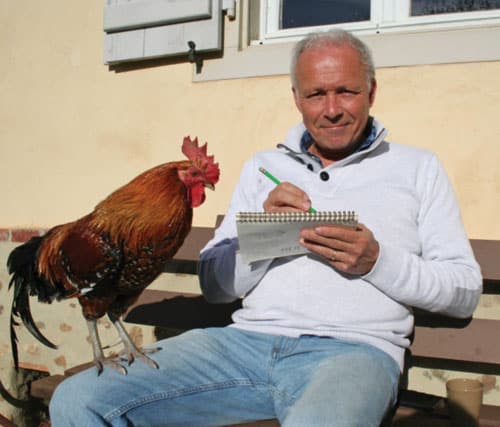
[laughter]
Perry: You can come down and help me do the weeding anytime. I was down at seven o’clock this morning and I got out there and I thought, “Before it gets hot” I was out there pulling all the weeds out from between the onions and the tomatoes, but no, it’s great, do you know, that’s a great one.
You can turn off from everything. You’re there, and there’s a hare that keeps coming by and loads of birds here. I love bird watching, nature is just bursting around here. Yes, I suppose we have found a little corner of paradise here.
